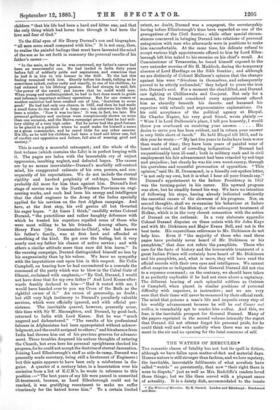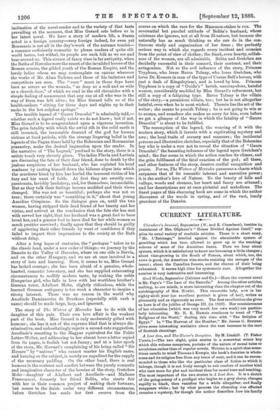THE WATERS OF HERCULES.* Tux romantic charm of fatality has
not lost its spell in fiction, although we have fallen upon matter-of-fact and material days. Human nature is still stronger than fashion, and we love mystery, the inevitable, inscrutable falfilments of what novelists have called " weirdo " so persistently, that now " their right there is none to dispute," just as well as Mrs. Radcliffe's readers loved those things ; but we like them served with a piquant sauce of actuality. It is a dainty dish, accommodated to the innate • The Waters of Hercules. By B. Gerard. London and Edinburgh : Blackwood and Sons. inclination of the novel-reader and to the variety of that taste prevailing at the moment, that Miss Gerard sets before us in her latest novel. We have a story bf modern life, a drama acted in a foreign country—very foreign indeed, for even yet Roumania is not all in the day's-work of the autumn tourist- s romance sufficiently romantic to please readers of quite old- world tastes, but withal, its people are such folk as we see and hear around us. This stream of fancy rises in far antiquity, when the Baths of Hercules were the resort of the invalided heroes of the Roman armies, the gilded youth of the Roman Empire, and the lovely ladies whom we may contemplate on canvas wherever the works of Mr. Alma Tadema and those of his imitators and competitors are seen. The " cure " must in those days have been as severe as the wounds, " as deep as a well and as wide as a church-door," of which we read in the old chronicles with a simple feeling of amazement that any one at all who was in the way of them was left alive ; for Miss Gerard tells us of the health-seekers " sitting for three days and nights up to their necks in the hot sulphur springs."
The terrible legend of " Gaunt' Dracului " is admirably told,— whether such a legend really exists we do not know ; but if not, Miss Gerard is to be congratulated upon a vigorous invention. The grim fatality with which the awful rift in the solid earth is still invested, the inexorable demand of the god for human victims at fixed periods, with the strange lingering belief in the legends of the Pagan times held by the Bohemian and Roumanian peasantry, make the desired impression upon the reader. In the narrative of " The Legend," prefixed to the story, there is a satiric touch very cleverly given. The ladies Flavia and Lavinia are discussing the fate of their dear friend, done to death by the jealous suspicions of her husband, who has expiated his brief madness by casting himself down the hideous abyss into which the murderer hired by him has hurled the innocent victim of his fury and his want of faith. At first they are sweetly com- passionate, lavishly laudatory, and, for themselves, inconsolable. But as they talk their feelings become modified and their views changed. She was not so beautiful ; perhaps she was not so true; there certainly was " something in it," about that young Aurelius Crispinus. So the dialogue goes on, until the two women, having stripped their dead friend of her beauty and her virtue, and arrived at the conclusion that the fate she has met with served her right, that her husband was a great fool to have loved her, and a greater fool to have died for her while women so much prettier survived ; finally agree that they should be guilty of aggrieving their other friends by want of confidence if they failed to impart their impressions to the society at the Bath without delay.
After a long lapse of centuries, the " prologue " takes us to the classic land, under a new order of things; we journey by the Danube to the Valley of Hercules, where on one side is Servia, and on the other Hungary, and we are at once involved in a story of love and learning. Here, it seems to us, Miss Gerard has lacked courage ; she has been afraid of a genuine, whole- hearted, romantic love-story, and she has supplied extenuating circumstances to mollify modern taste, by making the noble Hungarian girl, who falls in love with her worthless brother's German tutor, Adalbert Mohr, slightly ridiculous, while the learned German antiquary is too weak a character to inspire a strong interest. There was no reason in the world why Ascelinde Damianovics de Draskoes (especially with such a name) should be made large, lazy, and ignorant.
The story of The Waters of Hercules has to do with the daughter of this pair. Their own love affair is the weakest part of the book. Miss Gerard is only moderately gifted with humour; she has it not of the supreme kind that is always dis- criminative, and unhesitatingly rejects a second-rate suggestion. Ascelinde's resorting to the Magyar equivalent for the Polite Letter-Writer, and addressing to her absent lover a letter copied from its pages, is foolish but not funny; and at a later epoch of the story, Mr. Howard's complaining of his being called " Sir Houare" by "natives" who cannot master his English name, and harping on the subject, is merely an expedient for the supply of the necessary padding. On the other hand, there is real humour in the contrast and conflict between the purely romantic and imaginative character of the heroine of the story, Gretchen Mohr—daughter of Adalbert and Ascelinde—and Madame Francopazzi, formerly her friend Belita, who starts fair with her in their common project of making their fortunes, but comes to the finish under very different circumstances, before Gretchen has made her first swerve from the course on which the race for the Mammon-stakes is run. The reverential but puzzled attitude of Belita's husband, whose existence she ignores, not at all from ill-nature, but because she naturally has as much thinking as she can do in the con- tinuous study and organisation of her dress ; the perfectly serious way in which she regards every incident and occasion from the point of view of clothes ; the frank, even hearty, selfish- ness of the woman, are all admirable. Belita and Gretchen are decidedly successful in their concord, their contrast, and their antagonism. Not so the evil influence of the story, Princess Tryphosa, who loves Baron Tolnay, who loves Gretchen, who loves Dr. Somers (a man of the type of Currer Bell's heroes, with just a dash of Kingsleyism), and is loved by him. Princess Tryphosa is a copy of " °aide's " lavish, unscrupulous, hateful women, considerably modified by Miss Gerard's refinement, but still a copy of a fatiguing type. Baron Tolnay is the villain of the story,—a pernicious villain, too ; but he is not altogether hateful, even when he is most wicked. Therein lies the art of the writer ; she means to punish Tolnay ; he is not going to win or to escape, and somehow she makes us sorry for him, even before we get a glimpse of the way in which the fatality of " Genre Dracttlui " is about to be fulfilled.
The resumption of the legend, the weaving of it with the modern story, which it invests with a captivating mystery and awe ; the local traits of scenery and manners ; the incidental persons and illustrative sketches, especially that of the Bohemian boy who is under a vow not to reveal the situation of " Genre Draculni;" the haunting influence of the legend upon Gretchen's mind ; the fine scene in which the action reaches its climax, and the grim fulfilment of the fatal exaction of the god; all these, and other features of the story, deserve cordial recognition and praise. For us, The Waters of Hercules possesses a charm which surpasses that of its romantic interest and narrative power; it is the author's love of Nature. To the beauty of hills and valleys, woods and streams, her heart and fancy are attuned ; and her descriptions are at once pictorial and melodious. The finest pages of this charming book are some in which the author discourses of the woods in spring, and of the vast, lonely grandeur of the Danube.



































 Previous page
Previous page